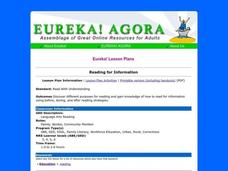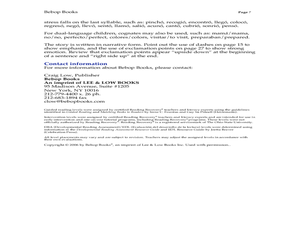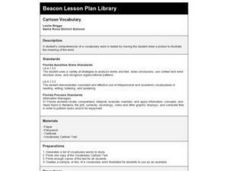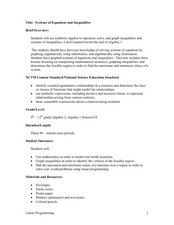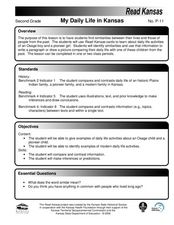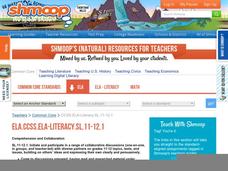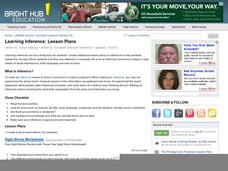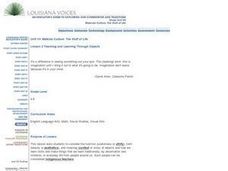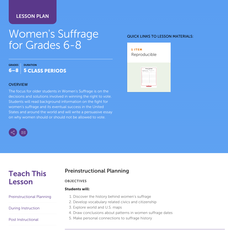Curated OER
Drawing Conclusions from Historical Fiction
Students read historical fiction. In this drawing conclusions lesson, students learn how to draw conclusions from text, specifically historical fiction. Students read Molly's Pilgrim and complete a graphic organizer where they answer...
Pennsylvania Department of Education
Drawing Conclusions Based on Literary Elements
Students compare versions of Cinderella and draw conclusions based on the story elements identified. In this literacy comprehension and story elements lesson, students read several versions of Cinderella, complete a "Comparing Folklore"...
Curated OER
Using Details from the Text
Explore non-fiction comprehension strategies with your class. They will visualize daily activities and label a 4 circle Venn diagram with related phrases. They must identify the overlapping sections as "main ideas," then complete a...
Read Works
How to Say “I Ruff You”
Who says you need a human to be your valentine on Valentine's Day? Give your dog-loving readers an inspiring perspective on how a sister givdes her brother a valentine from the family dog. They then answer 10 questions thatd involve...
Curated OER
Reading for Information
What should readers do to prepare for reading an informational text? What should they do during their reading? What should they do after completing such a text? Introduce your pupils to reading strategies and techniques to gain meaning...
Curated OER
Explicit Information versus Drawing Conclusions
Third graders identify explicit information and draw conclusions from text. In this instructional lesson, 3rd graders review models of each question type (explicit and conclusion) and practice reading a passage to answer questions.
Curriculum Corner
Inferencing
Inferencing is a necessary reading skill to uncover non-explicit messages in text. Use the set of resources as a way to guide learners toward becoming expert inferrers through reading prompts and literature with text and without text.
Curated OER
The Gingerbread Boy Comes Alive
Students make cut-out gingerbread cookies. After reading "The Gingerbread Boy", their cookies "disappear" and students must make predictions and draw conclusions about what happened to their cookies.
Curated OER
Guided Reading with Elizabeti's Doll
Practice reading strategies using Elizabeti's Doll by Stephanie Stuve-Bodeen. Readers utilize decoding and comprehension strategies before, during, and after reading the story. A detailed list of text features, high frequency words,...
Pennsylvania Department of Education
Analyzing Key Ideas and Details in Nonfiction
Students explore nonfiction texts. In this language arts instructional activity, students read a nonfiction text and make predictions. Students identify facts and opinions in the text and draw conclusions as they read.
College Board
Reading—Central Idea and Evidence
Young readers become experts at finding the central idea in informational text with an educational resource. The resource includes helpful tips to annotating close passages to succeed on the actual SAT exam, as well as strategies to make...
K5 Learning
The Fishhawk
Read about why the osprey is also known as the fishhawk in a short reading passage that describes where they live, what they eat, and what they look like. After reading, individuals respond to four short answer questions based on what...
Curated OER
Cartoon Vocabulary
Third and fourth graders complete a vocabulary log which includes a definition, and a sentence that demonstrates the meaning of the word. Then make an illustration that represents the definition of the word. The trick is that they may...
National Security Agency
Systems of Equations and Inequalities
High school classes can use manipulatives too! Offer hands-on, interactive lessons that venture away from the typical day in your algebra class. Young mathematicians will be involved in collaborative learning, visual representations, and...
Curated OER
My Daily Life in Kansas
Second graders use 'Read Kansas' cards to learn about the daily life activities of an Osage boy and a pioneer girl. In this similarities and differences lesson, 2nd graders write a paragraph and draw a picture comparing their daily life...
National History Day
Helping Life and Aiding Death: Science, Technology, and Engineering at Work during World War I
Science, engineering, and United States history? Pupils research collections of artifacts from the Smithsonian to learn about historical scientific innovations. At the end of the lesson, they write an essay to discuss technology's...
Shmoop
ELA.CCSS.ELA-Literacy.SL.11-12.1
You want your class to meet all of the Common Core standards, and here is one way to tackle the first speaking and listening standard. Given a theme to focus on from "How Much Land Does a Man Need?" by Leo Tolstoy, small groups come up...
Curated OER
Sequence, Predict, Infer: Pink and Say
Practice sequencing with your 2nd graders via Patricia Polacco's Civil War book Pink and Say. Begin with a blindfold and a bag of mystery items. Connect their use of clues to identify what they can't see with the skill of making...
Curated OER
Geometers Sketchpad Practice
Students create polygons using geometers sketchpad. In this geometry lesson, students construct the interior angles of polygons and label the different points. They estimate and measure the different parts as they draw conclusion.
Curated OER
Learning Inference
Making inferences can be a tricky proposition for middle schoolers. In the lesson presented here, pupils practice the skill of drawing a conclusion and making a judgment - which are what making an inference is all about! There are five...
Super Teacher Worksheets
Inferences
Inferring text can be tricky, but practice makes proficient! Provide your scholars with the practice they need with this inferences worksheet in which learners read mini paragraphs and choose the best inference from four multiple choice...
Curated OER
Teaching and Learning Through Objects
Students identify and interpret the function, usefulness or utitlity, form, beauty or aesthetics, and meaning, context or story, of objects and how they learn new skills and make things that they learn traditionally, by observation and...
Houghton Mifflin Harcourt
Grade 4 Reading Item Specifications
Is it the end of the school year and you're in need of test practice? Use a set of reading passages to challenge fourth graders to answer questions based on what they read. Some of the questions require readers to compare and contrast a...
Scholastic
Women's Suffrage for Grades 6–8
Learners study the decisions and solutions involved in winning the right to vote. After reading background information on the fight for women's suffrage, including one woman's story, and its eventual success in the United States and...






